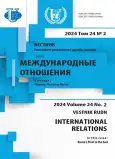Central Asia - Center Gas Pipeline System: Challenges and Opportunities for Modern Russia - Central Asia Energy Relations
- 作者: Ranjbar D.1, Mukan S.M.2, Niyazgulova A.A.2
-
隶属关系:
- RUDN University
- International Information Technology University
- 期: 卷 24, 编号 2 (2024): Russia’s Pivot to the East
- 页面: 216-226
- 栏目: THEMATIC DOSSIER
- URL: https://journal-vniispk.ru/2313-0660/article/view/320704
- DOI: https://doi.org/10.22363/2313-0660-2024-24-2-216-226
- EDN: https://elibrary.ru/VWERON
- ID: 320704
如何引用文章
详细
The recently formed “Gas Union” of Russia, Kazakhstan and Uzbekistan is at a turning point, symbolizing a major shift in the energy dynamics of Central Asia. The goal of this tripartite alliance, initiated by Russian President Vladimir Putin, is to transport Russian gas to Uzbekistan through Kazakhstan. This event marks a historic moment, as it is the first time that Russian gas has been imported into Central Asia. Against the backdrop of acute energy problems in the region, this union is aimed at meeting the immediate needs of the member states from Central Asia, but it also leaves many long-term geopolitical and economic issues for the parties involved. This article aims to comprehensively analyze the Central Asia - Center gas pipeline within the framework of the emerging Russia - Central Asia Gas Union. It seeks to identify and discuss the geopolitical, economic, and environmental challenges and opportunities this renewed energy cooperation presents. The scope of this study encompasses an examination of the historical context of the pipeline, the strategic objectives of the involved nations, and the potential implications for the regional and global energy landscape. The research methodology includes a thorough review of existing literature, policy documents, and energy reports. The theoretical foundation of the study is based on neoliberal theory. The authors conclude that the creation of a new energy alliance is a sign of the beginning of a new stage in the transformation of energy cooperation between Russia and the Central Asian countries.
关键词
作者简介
Daniyal Ranjbar
RUDN University
编辑信件的主要联系方式.
Email: randzhbar_meshkin_d@pfur.ru
ORCID iD: 0000-0002-1619-3383
SPIN 代码: 5294-1502
Assistant, Department of Theory and History of International Relations
Moscow, Russian FederationSaken Mukan
International Information Technology University
Email: s.mukan@iitu.edu.kz
ORCID iD: 0000-0003-0652-2806
PhD (International Relations), Professor, Department of Media Communications and History of Kazakhstan
Almaty, Republic of KazakhstanAigul Niyazgulova
International Information Technology University
Email: a.nijasgulova@iitu.edu.kz
ORCID iD: 0000-0003-2728-6814
PhD (Media Communications), Head, Department of Media Communications and History of Kazakhstan
Almaty, Republic of Kazakhstan参考
- Aminjonov, F. (2018). Energy security policies of the Central Asian countries: Hydrocarbons and electric power sectors. Almaty: Eurasian Research Institute.
- Ananyev, B. (2019). Sanctions in IR: Understanding, defining, studying. International Organisations Research Journal, 14(3), 136–150. https://doi.org/10.17323/1996-7845-2019-03-07; EDN: YNACQW
- Arzhaev, F. I. (2023). Russia’s geo-economic strategy in Central Asia under sanctions pressure. Research Result. Economic Research, 9(3), 5–15. (In Russian). https:/doi.org/10.18413/2409-1634-2023-9-3-0-1; EDN: VMSVBR
- Askhat, G., Mukan, S., & Saudabekova, E. (2021). Kazakhstan’s energy policy in the context of sustainable development implementation. Journal of Central Asian Studies, 83(3), 45–52. https://doi.org/10.52536/2788-5909.2021-3.04
- Bahgat, G. (2011). Energy security: An interdisciplinary approach. Chichester, West Sussex, U.K.: Wiley.
- Bazavluk, S. V., Kurylev, K. P., & Savin, L. V. (2022). Eurasianism, Eurasian Economic Union and multipolarity: Assessments of foreign experts. Vestnik RUDN. International Relations, 22(1), 30–42. https://doi.org/10.22363/2313-0660-2022-22-1-30-42; EDN: TEDHBW
- Beloglazov, A. V. (2008). Russian energetic policy in Central Asia in early 21st century (2000–2007). Uchenye Zapiski Kazanskogo Universiteta. Seriya Gumanitarnye Nauki, 150(7), 219–232. (In Russian). EDN: JVWEZD
- Chuvychkina, I. A. (2023). Transformation of Russian-European Union energy relations in the context of sanctions policy. Economic and Social Problems of Russia, (2), 31–45. (In Russian). https://doi.org/10.31249/espr/2023.02.02; EDN: FNWXKP
- Grozin, A. V. (2023). The gas alliance project and prospects for the formation of the Russia — South Asia gas transportation system. Geoekonomika Energetiki, 21(1), 56–78. (In Russian). https://doi.org/10.48137/26870703_2022_21_1_56; EDN: CFWHHT
- Honrada, G. J., Ranjbar, D., & Mukan, S. (2023). Regional democratization: A comparative analysis of EU and US efforts in Central Asia and Southeast Asia. Journal of International Studies, 19(2), 277–306. Retrieved from https://e-journal.uum.edu.my/index.php/jis/article/view/16476
- Kharitonova, V. (2023). Energy of greater Eurasia: Prospects and achievements. Geoekonomika Energetiki, 21(1), 79–92. (In Russian). https://doi.org/10.48137/26870703_2022_21_1_79; EDN: HHQHGG
- Kratochwil, F. (1982). On the notion of “interest” in international relations. International Organization, 36(1), 1–30. https://doi.org/10.1017/S0020818300004768
- Lv, Yongjun. (2023). Transitioning to sustainable energy: Opportunities, challenges, and the potential of block chain technology. Frontiers in Energy Research, 11, 1–20. https://doi.org/10.3389/fenrg.2023.1258044
- Pan’shina, D. A., & Ufimtseva, O. V. (2016). National interests as the basic concept in the international relations theory. Vestnik Sotsial’no-Gumanitarnogo Obrazovaniya i Nauki, (4), 22–25. (In Russian). EDN: YLNTKQ
- Saidov, A. Kh., & Kashinskaya, L. F. (2005). National security and national interests: Relations and interaction (experience of political and legal analysis). Journal of Russian Law, (12), 119–126. (In Russian). EDN: OPCVGV
- Salikhov, T. P., & Nasyrov, T. H. (2005). The conception of the use of renewable energy sources and their role in the energy balance of Uzbekistan. In A. Iacomelli (Ed.), Renewable energies for Central Asia countries: Economic, environmental and social impacts (pp. 103–121). Dordrecht: Springer. https://doi.org/10.1007/1-4020-3926-3_9
- Shaffer, B. (2009). Energy politics. Philadelphia: University of Pennsylvania Press.
- Strokan, M. (2023). A window to India? The trilateral gas union and Russia’s energy pivot to Asia. Asian Affairs, 54(3), 498–526. https://doi.org/10.1080/03068374.2023.2254077
- Tazetdinov, V. I. (2011). The history of the development of large-diameter pipe production: From the Central Asia — Center gas pipelines to the “White metallurgy”. Aktual’nye Voprosy Ekonomicheskikh Nauk, (21–2), 211–215. (In Russian). EDN: RWADHP
- Yazdani, E. (2021). Foreign relations in Central Asia: A comparison between the Soviet and post-Soviet era. Comparative Politics Russia, 12(4), 56–67. https://doi.org/10.24412/2221-3279-2021-10040; EDN: RONCVI
- Zhade, Z. A. (2005). National interests and security of Russia in the context of geopolitics. Vestnik Adygeiskogo Gosudarstvennogo Universiteta, (5), 59–63. (In Russian). EDN: JXZDNV
补充文件









